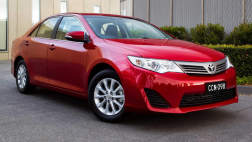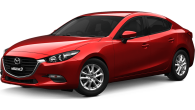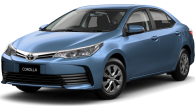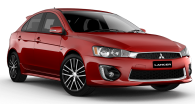It is staggering news in a luxury class where customers are paying at least $92,900 to drive away in a new Five and $114,500 — or more — for the new diesel pin-up.
Few of these buyers would be worried about the price of petrol, or how much they spend on their star new car.
Yet more and more of them — BMW Australia says its 20 per cent prediction could be conservative — are taking the diesel road.
BMW says they are attracted by the obvious fuel economy and the extended pump-to-pump refuelling range, but also by the growing refinement in the company's diesel engines.
That refinement, it says, comes in everything from the engine noise to all-round performance.
It is not the only carmaker finding extra friends with diesel.
Peugeot and Mercedes have done well in a limited way with diesels in the past, but things are picking up and even Jaguar is doing a diesel in its S-Type — a direct rival to the Five.
"It is slowly catching on. But it is already an overwhelming success in our X5," BMW Australia managing director Franz Sauter says.
BMW has a huge hit in Europe with its 3-Series diesels, which are sold for performance as much as economy, and it trumpets the technical work on the 530d.
The 530d 3.0-litre motor is a classic BMW inline six, with a turbocharger to force-feed it.
The car can accelerate to 100km/h in a respectable 7.2 seconds, thanks to 160kW and 480Nm in a flat plateau from 1750 to 2750 revs.
The diesel motor is never going to match the 8000-plus rev range of the M3 and M5 supercars, but it is more flexible than a diesel truck and its redline is in the 4000 range.
To put the 530d in perspective, the sporty 530i cuts only a 6.7-second time from 0-100km/h, so few people will notice the difference.
And the D-car feels stronger in a way, because it gets its pace from torque. That means you can feel a solid push from just above idle speed.
Fuel economy is obviously a big plus with the 530d, and BMW says its combined test figure is 7.5 litres/100km with a 900km-plus range between refuels.
"Fuel consumption is comparable to a much smaller, less powerful car," Sauter says.
But the D-car is still a Five, which means all the usual BMW luxury equipment and safety gear.
So it has a "smart" airbag package with front, side and head bags, dynamic stability control, traction control and anti-skid brakes with dynamic control for maximum stopping power.
Obviously it has power steering, auto airconditioning, alloy wheels and BMW's latest iDrive computer system, automatic headlamps, rain-sensor wipers, leather upholstery, 10-speaker sound, power windows and mirrors.
Options include an M Sport package with 18-inch alloys, spoilers and sports suspension.
ON THE ROAD
The 530d is one of the nicer-driving cars we have had through the test garage. It is low-key, no-stress, enjoyable and effective.
It takes a bit of adjustment after driving some of BMW's high-revving sports sedans, but it is surprisingly quick. And it does the job without forcing you to think like a racer.
Everyone on our test team, except one, has come to like the latest new-age diesels because they are pacey, refined and make sense.
You don't have to be anti-social or aggressive, because a diesel does the job with monster torque and that means you always have plenty of thrust. So a stoplight run can be surprisingly quick.
It helps to have a classy six-speed automatic behind the engine, with touch-change control for manual driving, but the engine itself is impressive, with lightweight construction, hi-tech electronics and even a 17:1 compression ratio with a redline beyond 5000 revs.
The economy is great. We got an easy 8.4 litres/100km with some spirited driving. Long-distance highway work would probably take the figure down into the six-something range.
That means more than 1000km between fuel stops, though we can't understand why a litre of diesel often costs more than the same sip of premium unleaded.
The 530d is surprisingly responsive. Diesels usually take plenty of winding up, but the turbodiesel in the Five has solid response and gets going from low revs.
You can definitely wind it out between corners and the power is good enough to make it feel like a proper BMW sports sedan.
The engine is the best turbodiesel we have tried. It does not have the all-out surge of some of Benz's big motors, or the economy of some of the smaller French diesels, but it is an engine that will continue to win many friends.
The rest of the 530d is as good as any Five, though we continue to dislike the iDrive computer controller.
It is tough to find direct rivals to the 530d, but all the Euro brands will eventually bring their full diesel range to Australia. The current E-Series Benz is not as refined, but the Audi A6 quattro is a sweet car.
The test car came close to $140,000, with extra gear including adaptive cornering lamps. We enjoyed the equipment in the sports pack but were less impressed by the turning lamps and the sunroof.
Still, the Five is a good car and the diesel engine gives it a new edge.
THE BOTTOM LINE
Proof, and plenty of it, that driving a diesel can be more than just a fuel economy choice for long-distance trips.
78/100
BMW 530D 2006: Sport
| Engine Type | Diesel Turbo 6, 3.0L |
|---|---|
| Fuel Type | Diesel |
| Fuel Efficiency | 10.3L/100km (combined) |
| Seating | 5 |
| Price From | $12,760 - $17,050 |
Range and Specs
| Vehicle | Specs | Price* |
|---|---|---|
| 530d Base | 3.0L, Diesel, 6 SPEED AUTO STEPTRONIC | $12,320 - $16,500 |
| 530d Sport | 3.0L, Diesel, 6 SPEED AUTO STEPTRONIC | $12,760 - $17,050 |


















.png)




